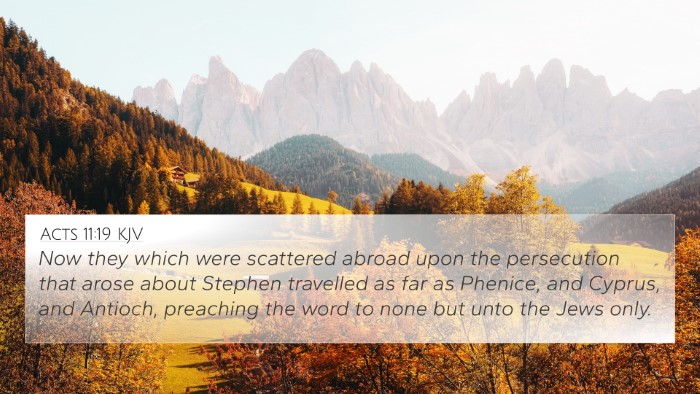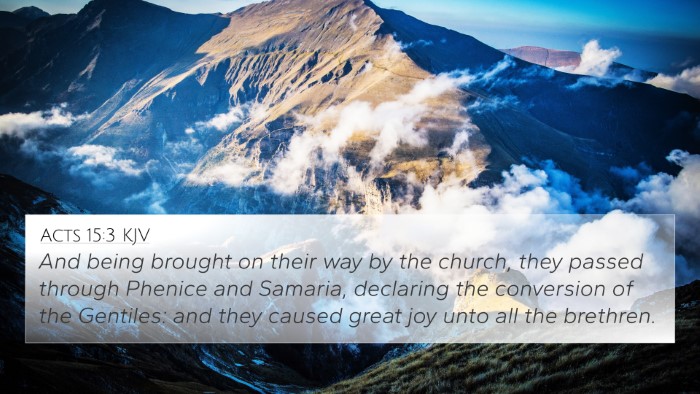Understanding Acts 21:2
Acts 21:2 states, "And finding a ship sailing over unto Phenicia, we went aboard, and set forth." This passage, while straightforward, carries several layers of meaning and significance that can be explored through various commentaries.
Commentary Insights
Matthew Henry's Commentary: Matthew Henry emphasizes the purpose of Paul's journey and the determination of the apostles to continue spreading the Gospel. He points out that the journey highlights the active role of the apostles in seeking opportunities to preach, despite the trials and dangers they faced. Finding a ship to sail was not just a casual occurrence; it was a testament to God's provision in their missionary work.
Albert Barnes' Notes: Albert Barnes provides a deeper exploration of the geographical significance of Phenicia. He notes that this region was crucial for trade and communication during the time of Paul. The selection of Phenicia as a destination implies an intention to reach out to established communities where the gospel could take root. The commentary also highlights the collaborative nature of Paul's mission work, underlined by the use of "we," indicating the presence of fellow travelers and believers.
Adam Clarke's Commentary: Adam Clarke underscores the importance of travel in the early church and how it was vital for the spread of the Christian faith. Clarke delves into the symbolism of sailing, noting it as an emblem of transition and a metaphor for the Christian life, where believers are often called to navigate difficult waters. He emphasizes that this journey was both physical and spiritual, representing Paul’s commitment to his mission.
Key Themes and Connections
Acts 21:2 illustrates several interconnected themes and can be cross-referenced with various biblical texts to deepen understanding:
- Acts 20:22-24: Paul's determination as he headed toward Jerusalem, exemplifying endurance in service.
- Romans 1:15: Paul's eagerness to share the Gospel wherever he travels.
- 1 Corinthians 9:22: His adaptable nature in reaching different people groups with the message of Christ.
- Acts 13:13: Discussing previous missionary journeys that show precedent for travel and outreach.
- Acts 16:11-12: Highlighting new territories entered through travel, showing early church expansion efforts.
- Mark 16:15: Jesus’ command to go into all the world to preach the Gospel, reflecting the founding principles of Paul’s mission.
- Ephesians 6:19: Seeking boldness in proclaiming the gospel, paralleling Paul's relentless pursuits.
Cross-Referencing in Scripture
This verse can lead to an extensive exercise in cross-referencing Biblical texts that can help in comprehensively studying the implications of Paul’s missionary efforts:
By exploring thematic Bible verse connections, we can see how the apostles’ travels align with directives from Jesus, showcasing a consistent mission strategy. The importance of understanding cross-references for sermon preparation cannot be overstated as it enriches the context significantly.
Tools for Effective Bible Study
For those seeking to dive deeper, various tools can aid in Bible cross-reference studies. Utilizing a Bible concordance or a cross-reference Bible study guide allows one to identify Bible verses that relate to each other effectively. Such tools are part of a comprehensive study approach, helping to unveil inter-Biblical dialogue that enriches understanding.
Concluding Thoughts
In summary, Acts 21:2 serves not only as a logistical note in Paul's journey but also reveals profound themes of mission, perseverance, and divine guidance. Emphasis on cross-referencing draws attention to the interconnected nature of Scripture, enhancing our understanding of how various parts of the Bible resonate with one another.
Explorations of Bible verse parallels and thematic connections can yield enlightening perspectives on both the personal application of Scripture and the broader narrative of God's plan. Understanding these connections is essential for any serious student of the Word.






